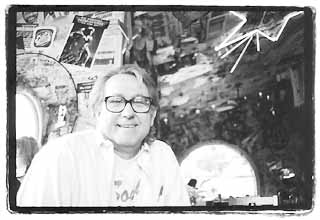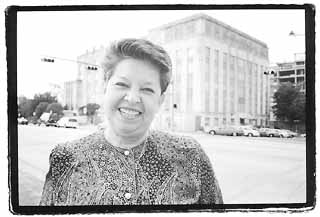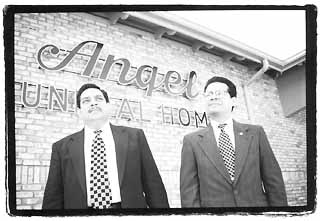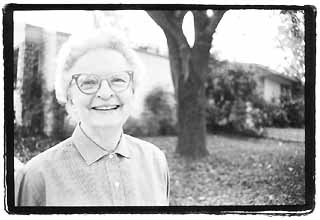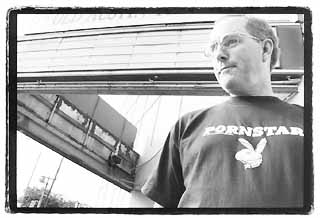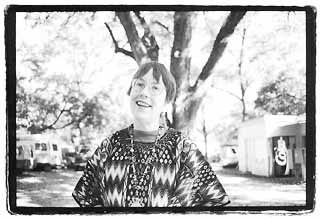Celebrity, South Austin Style
The Mayor of South Austin
Fri., Dec. 4, 1998
|
|
When Danny Young talks about his arrival in South Austin from Kingsville 23 years ago, he doesn't simply say "I moved here." He weaves a romantic tale that rivals many married couples' stories of their first meeting. Young fell hard. Kind of a chance-meeting, love-at-first-site, across-a-crowded-city thing. "About three days in, I said, 'I don't know what it is, but for the first time in my life I really have this sense of belonging. It's sort of like when I met my wife, that old deal, 'You'll know when it's right.' It sounds corny as hell, but it doesn't negate how strong that feeling is."
More than two decades later, the unofficial "Mayor of South Austin" and owner of the Texicalli Grille on Oltorf is still hopelessly in love with his corner of the world and the folks who dwell there. "It's the diversity," he explains, as he sits in a booth after the lunchtime crunch at the Texicalli. "In South Austin, there's a high level of respect for that great individual spirit, and an attitude of 'This is what I do, how does it plug into the rest of the community?'"
Indeed, Young seems to wrap his arms around the eccentricities of South Austin and give them a bear hug. His restaurant is a tribute to the eclectic mix of music, arts, and politics in the land south of Town Lake. He gushes about the lady who stands in front of Texas French Bread screaming at passersby. "You'd never see her in Hyde Park," he chuckles. And when he coos about the Oltorf HEB store, well, let's just say you've never heard anyone as enthusiastic as Young is about a grocery store. "My God," he says, slapping the table excitedly. "This HEB down here is so culturally rich. You will see everything and everybody there, from the old big-money Travis Heights people to whoever the newest immigrant wave coming into the city [is]. I know it scares some people elsewhere, but in South Austin, I think we like it here because we don't always just look around at a replica of ourselves."
But Young worries that some efforts to revamp his part of town do not have that same appreciation for South Austin's motley stew. The words "new South Austin" vex him. It's like telling a man that the love of his life is ugly and needs plastic surgery. "Some people want to get rid of the South Austin funk, but I'm not one of them -- I like the funk. South Austin has always been a really culturally rich and diverse place, and it's too quickly becoming the next Yuppieville. Why can't we all just live here like we always have?"
Ask him about the Cinema West hoopla and you'll get an earful: "Can I talk right into the microphone?" he asks, pulling a tape recorder close to his face so as not to lose a syllable. "It annoys the shit out of me! This idea that somehow this is going to be a superhuman wonderful place if we don't have to deal with 'those' people is ridiculous. This whole 'Here comes the neighborhood' thing is just a little insulting."
Young is quick to add that it isn't the idea of change that he resists. He thrives on the dynamic nature of the south city. "I was raised in a town that didn't change, and I couldn't wait to get out." What sends chills down his spine is what he calls the "Stepfordization" of South Austin.
But Young remains faithful that in the end, the spirit of South Austin will prevail: "I love Austin. I like dang near every part of Austin, it's great, it's fun, and I dig it. But I'll tell you something," he says, lowering his booming voice a bit as if he is about to pass along a mystical secret. "I belong here. There's some real strong force that says, 'This is it, this area from the river to Ben White; from 35 to MoPac is home.' It took me 33 years to find -- and it's home." --Lisa Tozzi
The Wonder Years
|
|
Back in the early Fifties, Margaret Gómez didn't know a whole lot of English when she started first grade at Becker Elementary. "But would you believe," she asks incredulously, "that I was translating for the other kids who couldn't speak English?" Well, yes, we can believe it, because that's the kind of girl Margaret is -- a real team player. Today, Margaret, 54, is still hanging in -- this time as South Austin's two-term representative on the Travis County Commissioners Court and vice chair of the Capital Metro board, among other things.
Let's ask her about South Austin in the early days. Those days go back a ways, too, since her family moved here from Comal County when she was all of three months old. They lived on Jewell Street, in a little house that still stands today under the family name. It's prime rental property now, especially since Margaret's father renovated the place back in 1980.
"Basically," says Margaret, "I walked everywhere. I walked to school. I walked to San Jose Parish, the grocery store, the post office. I remember how I liked to take different routes home. I used to walk past Cinema West all the time, but that was when they showed regular movies. The world seemed like such a big place then." Little did she know then that she would grow up to be a two-term constable and later a two-term county commissioner.
In the sixth grade, Margaret started playing the violin. She played in the orchestra and got a special scholarship to take her lessons from music teachers at the University of Texas. She would walk to the bus stop, just a little thing carrying her violin case, and hop on the bus to UT. "I was lucky to have gained a real appreciation for classical music," she says.
Margaret went on to Fulmore Middle School and Travis High School, class of 1962. Her teenage years were a blast. On Friday and Saturday nights, there were big dances at the City Coliseum, and Margaret's dad would drive her and a bunch of her friends over and drop them off. All the top Mexican-American musicians would perform -- Alfonso Ramos, sometimes joined by his brother Ruben; Little Joe y la Familia (then Little Joe and the Latineers), and -- gosh almighty -- Sonny and the Sunliners, who were in big demand from Austin to El Paso. They were great. All the girls would just swoon when Sonny and the Sunliners would play their hit English-language single, "Talk to Me." Margaret knew all the dances, too -- the polka, the cumbia, the mambo. Sometimes she'd dance with one of the Limon boys. "All of them were such good dancers," she says of Austin's omnipresent Limon family of restaurant and other entrepreneurial endeavors. And after the last dance, Margaret and her friends would head back home, up the hill to Jewell Street.
Granted, not everything was peachy keen. There were cultural differences. The cheerleaders and the football players, they were Anglo, mostly, and popular, and pretty, and probably blonde. There were those cliques. But that was okay. Margaret was pretty and she had her own set of friends. Still, those cultural differences made for some embarrassing moments. In gym class, they'd make them suit out in shorts, and since Margaret's conservative parents never let her wear shorts at home, you can imagine how exposed she felt wearing those little shorts on the school grounds.
There were some rivalries, also, between the Mexican-Americans who lived in East Austin and those who lived in South Austin. "I think East Austin Hispanics were more traditional," she says. "And South Austin Hispanics were more mainstream, or in the process of entering the mainstream. Folks from East Austin now talk about the old days, in the Fifties and Sixties. They talk about the rivalries. But I think those rivalries may have lived more in the imagination than anything else."
Margaret eventually went on to graduate from St. Edward's University. See why she loves this neighborhood? "South Austin," says Margaret, "has everything you need." --Amy Smith
Family Traditions
|
|
Through its very architecture, the Angel Funeral Home on South First is designed to fit into the Hispanic South Austin community, offering two large chapels, rather than the smaller state rooms typical of many funeral homes, for all-night Catholic vigils. In a business increasingly dominated by corporate owners, the family-operated Angel is also a rarity; reasonably priced services and flexible accommodations for grieving families are standard practice. Yet even as the funeral home he purchased 15 years ago remains firmly rooted in the cultural landscape of South Austin, Sam DeLeon's family has not clung to a "traditional" Hispanic identity. The DeLeons, who arrived here in the 1930s when Sam's newlywed parents, Mack and Beatrice, moved to Austin from a rural area near Waco, have integrated themselves into the wider culture as successful entrepreneurs. Today, the DeLeon family has expanded beyond South Austin, both culturally and materially.
The DeLeons originally settled in Govalle, in East Austin, where Mack and Beatrice raised four sons -- Sam, Mack Jr., Jim, and Hector -- and a daughter, Gloria. Beatrice took a job in the pharmacy at the University of Texas, while Mack became a chef who occasionally waited on the Lyndon B. Johnson family, his kids playing with Little Beagle Johnson at picnics and becoming enamored of politics at an early age. Hector and Mack Jr. eventually ran paper routes that carried them right up the steps of the Capitol, and Hector worked for the 1960 John F. Kennedy campaign as a teenager, going on to work other statewide campaigns throughout the Sixties and serving as a Democratic Texas delegate in the 1980s.
But the "spirit of free enterprise" that infuses the family began with Mack Sr. himself. In the early 1950s he opened El Patio on Guadalupe, one of the first restaurants in town to introduce Mexican food to non-Hispanics. Now all but one of the five children own their own businesses in Austin. Gloria owns Wholehealth Services, a re-certification school for nurses on South Congress. When Sam was 26, he purchased his first funeral home in Lockhart. Seven years later he bought the Angel Funeral Home, then located on South Congress, and his son, Bryan, 30, now oversees daily operations there.
But while Sam has quietly taken care of business, brothers Hector and Mackhave become prominent in local politics, and their affiliations are illustrative of the various ways the DeLeons have negotiated their ethnicity. Mack, a devout but conservative Democrat, managed campaigns for former Travis County Commissioner Hank Gonzalez, who ousted incumbent Richard Moya in 1986, then converted to the GOP and got booted next election by Marcus DeLeon (no relation), whose East Austin contingent felt Gonzalez was a little too tight with the purse strings. Mack says his friendship with Gonzalez and his conservative beliefs prompted him to head Gonzalez's campaign again this year when he ran against Democrat Sam Biscoe for county judge. Hector, meanwhile, who inherited Democratic loyalty from his parents and still keeps a portrait of Texas Sen. Henry B. Gonzalez on his office wall, found the Dems less than supportive when he ran for City Council in 1983, his West Lake Hills home and non-Hispanic wife alienating him from the party. He has since become a big Republican booster. "God forbid that any one of us actually accomplished the American dream," says Hector, an insurance lawyer who has been a generous donor to schools and churches in East Austin. "If you're successful, people say, 'He's forgotten his people.'"
Sam, meanwhile, through his daily association with neighborhood families, has become a fixture in South Austin, though he sent his two children to private schools. Bryan says of his high-school daysat Kirby Hall School that "I was the diversity" in the student body. He studied history and English at the University of Texas, and wanted to become a lawyer before he discovered that he liked the satisfaction of helping people face to face and joined his father at the funeral home. He says his family has always believed that success is ultimately the best means for Hispanics to gain equality in American society. "I think when you excel, you bring up the stock of whatever particular ethnicity you're in," he says, noting that "It's impossible for me to ignore the fact that I am a minority," but that his uncles Mack and Hector have always said the best way to right injustice is working through the existing system. "Just because I've moved out of a particular neighborhood doesn't mean that I've moved out of my ethnicity,"says Bryan. "How do I enhance the plight of people who don't have that opportunity?" --Kevin Fullerton
The Sacred Matriarch
|
|
You're sitting in the living room of Shudde Fath's home up the hill from Barton Springs Road and she's telling you stories, mostly political stories that revolve around City Council elections, precinct feuds, and anti-Nuke shenanigans. This 82-year-old Zilker Neighborhood Association activist and 21-year member of the Electric Utility Commission goes way, way back. She has plenty to talk about, dating back to her Bastrop roots, all the way up to the previous weekend, when she and folks from the Save Barton Creek Association huddled in her living room to stuff SBCA newsletters into envelopes.
"I like to do things that have relevance," she says. "I like to be involved in what's going on in the community." On the coffee table are the Wall Street Journal, TheTexas Observer, Texas Monthly, the Statesman folded open to page B3, and a splendidly colorful issue of National Geographic. All that's missing in this charmed circle of relevance is a certain local weekly -- but it's there, after all, on a little table next to where she is sitting.
That morning before the interview, a rare set of circumstances found you giving Daryl Slusher -- a city councilmember and a former politics editor of this paper -- a lift into town. With the gods of synchronized traffic lights working miraculously in your favor down South First Street, you mention you have an interview with Shudde (pronounced Shoodie) later that day. Which reminds Daryl of a funny story. Many years ago, when Shudde and her late husband Conrad, or Connie, owned a fish and boat shop, located until 1966 on the site of the recently closed Good Eats Cafe on Barton Springs Road, a car towing a boat careened down the hill and plowed right into the shop, tearing a hole into the building.
Connie, who died in 1990, loved telling that story. He was the funny one, the eloquent one, and Shudde's partner in crime when it came to nipping "the establishment" in the butt. Later, Shudde is standing in her living room recounting the very same story about the car plunging into the boat shop. "They carried it in the newspaper," she says, laughing. "They ran a picture of it."
After a couple of hours you're thinking you've got a pretty good story of your own to tell, about how Shudde is a sacred matriarch of South Austin, certainly within the white, progressive-enviro-yellow-dog-pack that she has traveled in all these years. When you stand up to leave, something catches your eye. Off to the side, behind Connie's old grand piano, is a quiet alcove with track lighting that gives off a celestial glow. There's a dynamic black bass mounted on the wall ("Connie's biggest black bass ever") and, below that, hundreds of fishing lures sitting expectantly in narrow trays on a long table. The lures are brilliant, some red, some tiger-striped, some with bright green feathers, and some with glass eyes cast coyly in the direction of glistening, come-hither hooks. You should see these lures. Many of them date back to the Thirties, when Connie, who had fished the waters of Texas and Mexico, and fly-fished on the mighty Gunnison in Colorado, began collecting them. "This," Shudde explains excitedly, "this is my latest project."
A few months ago, Shudde and her daughter Betsy steeled themselves against the pain of memory and delved into Connie's nest egg of lures. Shudde bought a reference book on pre-1960 fishing tackle and began categorizing Connie's lures by name: Frog Pappy, Whopper Stopper, Dipsy Doodle, Bug-a-Boo, and so forth. This was pretty meticulous work, but Shudde always was the detail person. She plans to auction off the collection, and she has a guy advising her on how to sell the loot.
There's something about these lures that makes Shudde smile. In the early days, Shudde and Connie used to fish out of a canoe. They would sit all day and fish and occasionally nip from a bottle that Connie would bring along. They'd eat sandwiches under a blazing sun. Those were the days. For all of Shudde's political and civic activities -- her current memberships number in the 20s -- there's another side of her that everyone should know: the side that declares with remarkably youthful glee that she not only loved Connie but was wildly in love with him, right up until the day he died, two weeks shy of 77. She misses him terribly, she says, but in a good way. In the meantime, she'll go on fighting the good fight. --Amy Smith
The Man of the Hour
|
|
It is rare to ever find Henry Benedict home during the day, and if you do, you'd better be ready to talk business. Benedict is a businessman to the core. And lately, whatever this South Austin real estate broker does seems to receive roaring applause -- at least ever since he used his savvy to buy a run-down piece of property at the corner of South Congress and Live Oak. For Benedict, it seemed like a smart business move: a good location, a decent price. But this wasn't just any piece of prime South Austin real estate -- the property was the friendless porno house, Cinema West Adult Theatre, long hated by police, neighbors, shop owners, teachers, and school principals. When Benedict -- a veteran of the South Austin real estate game -- decided to carry out a dream and convert the adult theatre into a family movie house and community events center, "Benedict" quickly became the name spoken at dinner tables and in supermarkets all over town.
Immediately, everyone who had long prayed for the theatre's demise was falling all over themselves to help. The City Council offered to loan him $125,000 to buy the building (a deal it eventually backed away from). The district attorney's office filed a public nuisance suit against the theatre, and vice squad officers stepped up patrols, trolling the dark movie house aisles in denim cutoffs selling their wares (and prompting cries of "Entrapment!" from Cinema West management). But through it all, Benedict stayed focused on the business end of the plan. A family man himself and a one-time resident of the neighborhood (he now lives in Sunset Valley), Benedict admits he wanted to see the theatre gone as well. But he also admits he didn't like the politics and police involved. Nonetheless, the deal was already rolling. It was a deal of goodwill, maybe, but above all it was a good deal. Or so he thought.
Four months later, the dingy porno house marquee has been replaced, and the once-maligned building has been re-christened: "The Old Austin Theatre," the theatre's name back in the days it showed matinees of Old Yeller and Gary Cooper flicks. Finally, politicians, school principals, police, parents, and shop owners are happy. At a press conference last month, APD officers and members of the South Congress Coalition toasted the new face of South Congress Avenue. When the name Henry Benedict was mentioned, a deafening cheer erupted.
Benedict is now a hero to the neighbors of South Congress, but the truth is, the Cinema West deal could be one of his biggest real estate nightmares to date. Benedict says the city, so supportive of his efforts before, has become an unyielding wall of bureaucracy he does not care to climb. In order to get restoration even started, he'll have to cough up thousands of dollars worth of permits and licenses, and wade through mounds of red tape. So he's already looking to sell."I've had my 15 minutes, but the headaches of this are absolutely staggering," he says.
If Benedict can't sell the property to someone who will carry out the dream of opening a family movie house, he may have to sacrifice his newfound role of hero for one more familiar -- a smart businessman. So far, he says, there have been offers from all over the country from folks who want to buy the property "as is" and open a gentleman's club. So, could adult entertainment return to the corner of Congress and Live Oak? While Benedict is still set on his vision, he is a businessman first and foremost. "If it becomes clear to me that for whatever reason I can't make a reasonable profit, I won't cancel out that possibility." --Bryan Mealer
South Austin's Patron Saint
|
|
Susan Toomey Frost freely admits that she misses the Cinema West Adult Theatre. She wasn't a patron, but the seedy joint played a big role in her life nonetheless. "It was sweet to have my neighborhood theatre be a dirty theatre," she says. "It didn't hurt anything, it was part of a mix. I could always give instructions [to my house]: 'Turn left at the dirty movie theatre.' Everyone knew where it was. Now, if I have to say, 'Turn left at the South Austin multicultural film center,' they can't find me."
Toomey Frost has lived more than 13 years in South Austin, and except for the loss of the notorious local landmark, she approves of the changes underway in the area. "We have noodle shops here now," she says. "Used to be I had to go way up to North Lamar to go to a noodle shop."
Once an indefatigable neighborhood and environmental activist, Toomey Frost has been largely retired from the political scene since a quixotic City Council campaign in 1990 (which she lost in a runoff) soured her on local politics. Toomey Frost ran for council because she couldn't get the local press to pay attention to her complaints about an incumbent councilmember's campaign contributions:"I had the brilliant idea that if I just paid the $100 filing fee, reporters would have to cover what I said. The goal wasn't to win, it was to make the man change his behavior. And I overachieved and got into a runoff -- and he came in third."
But she saw too much. "In the process, I learned more than I needed to learn about my own people, and the way the system is set up," she said. "Many of them felt I had betrayed the cause -- environmentalism and neighborhoods and all of that stuff. I got accused of being a closet Republican." She's still approached every now and then to get back in the political game, but says, "I just don't want to get involved in that again. You spend all your time, and then what do you have to show for it?"
Formerly the frequent site of political fundraisers for liberal and progressive groups, today Toomey Frost's Travis Heights home more often hosts benefits for the Blanton Museum of Art or the "chamber music people" she says, "not that they're not political hotbeds in themselves."
One of Toomey Frost's current projects is delving into Texas art history, researching pottery and tiles made at the San Jose Mission in San Antonio. She's become recognized as an expert on the subject, and is authoring a forthcoming book.
When Toomey Frost restored her historic home, she toyed with making it a monument to South Austin culture by "adding historic restoration landscape architecture, which would involve things like car seats in the front, and a lot of yard art."
Although South Austin heritage is alive and well below the river, Austin's growth has done some damage. "We tend to pave over the very things that brought us here in the first place," she says. "But on the upside, you get all these neat people coming in here. The reason we're getting all that stuff on Auditorium Shores is more people are supporting the arts, [there is] more demand for it. All these wonderful bright people -- all those people having money drives up our cost of housing and all, but we benefit from it."
But despite all the physical and economic changes, Toomey Frost says spiritual South Austin, "closer to San Antonio, Mexico, and Heaven," will always be the same. And she maintains that the evolution her neighborhood is undergoing now will improve it: "It's changed for the better as far as I'm concerned. I just want more places to eat." --Jenny Staff
Got something to say on the subject? Send a letter to the editor.





